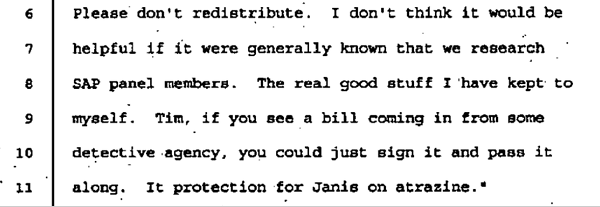As a journalist, it takes a lot to really piss me off: I’ve found that most scandals aren’t really scandals if you dig past the screaming headlines and into the wonky details. And, though I grew up a corporation-hating liberal, in nearly every story I’ve reported I’ve found that for the most part, businesspeople act honestly and honorably. The companies actually trying to make the world better often make easy targets, because when you are grappling with genuine complexity — which is what corporations do — you are bound to make mistakes.
And then, every once in a while, I come across a true scandal, and it tips me back toward cynicism.
That said, now I’m pissed off: Monday morning we learned that the ag-tech corporation Syngenta paid millions of dollars in a covert effort to protect its herbicide atrazine and discredit critics. (The story, put out by Environmental Health News and 100Reporters, is worth reading in full here.) It’s a solid case study illustrating the lengths a company will go to influence the scientific debate. And, usefully, the documents show who Syngenta was paying to shill for them.

Tyrone Hayes.
Here’s what happened: Since 1997 Tyrone Hayes, a scientist at the University of California, Berkeley, has been running experiments suggesting that atrazine causes sexual deformities in frogs. The Environmental Protection Agency disagrees that there is a problem with atrazine, based on two major studies (see the section on amphibians at the bottom). It’s worth noting, however, that Syngenta itself performed these studies. This isn’t a reason to throw the studies out, in my opinion, but they need to meet a higher standard.
So far, this looks like the normal exercise of scientific risk management — with one wrinkle: Somewhere along the line Hayes started venting his anger at Syngenta in verse, emailing its representatives aggressive rap takedowns, full of sexual imagery. A mild example:
Tyrone b hayes is hard as hell
battle anybody, i don’t care who you tell
you object! you will fail!
mercy for the weak is not for sale
This is either indicative of derangement or Bulworth-style hellraising, depending on your perspective. Either way, it doesn’t have much to do with the science. It seemed that Syngenta was patiently jumping through the regulatory hoops, and doing the studies that would show if its product was dangerous. At least before yesterday.
The breakthrough came when a water-management district in Illinois filed a lawsuit to force Syngenta to pay for the cost of removing atrazine from drinking water. That lawsuit was eventually settled out of court, but during discovery, the court forced Syngenta to turn over mounds of documents.

Syngenta hired detectives to dig up dirt on members of the Environmental Protection Agency’s scientific advisory board (SAP).
Those documents include memos showing that the company hired private detectives to dig up dirt on both Hayes and a judge working on the case. They show that Syngenta funneled money to the American Council on Science and Health, to the Hudson Institute (where Alex Avery of the institute’s Center for Global Food Issues attacked Hayes), and to Steven Milloy, publisher of junkscience.com and president of Citizens for the Integrity of Science. In return, the company got supportive blog posts and editorials.
“These are great clips for us because they get out some of our messages from someone who comes off sounding like an unbiased expert. Another strength is that the messages do not sound like they came from Syngenta,” wrote Syngenta’s head of communications.
None of this affects the science surrounding atrazine. But most people don’t actually read scientific papers — we rely on experts or journalists to interpret the results of studies. The Syngenta revelations suggest that if you believe large corporations play dirty to manipulate the public perception of science, you’re not a cynic at all — you’re a realist.
It’s hard to balance out the evidence when one heavily moneyed hand is pushing down on the scale. In a field like agriculture, where most of the money for research comes from corporations with a strong incentive to guide public opinion, it seems worth paying extra attention to independent reports from the likes of Tyrone Hayes — whether they comes in rap verse or not.




